Related Research Articles
Ibn al-Shaykh al-Libi was a Libyan national captured in Afghanistan in November 2001 after the fall of the Taliban; he was interrogated by American and Egyptian forces. The information he gave under torture to Egyptian authorities was cited by the George W. Bush Administration in the months preceding its 2003 invasion of Iraq as evidence of a connection between Saddam Hussein and al-Qaeda. That information was frequently repeated by members of the Bush Administration, although reports from both the Central Intelligence Agency (CIA) and the Defense Intelligence Agency (DIA) strongly questioned its credibility, suggesting that al-Libi was "intentionally misleading" interrogators.
Khadamat-e Aetla'at-e Dawlati, also known by the acronym KhAD, was the main security agency and intelligence agency of the former Democratic Republic of Afghanistan.
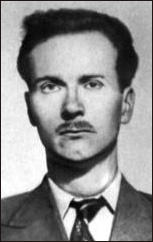
John Cairncross was a British civil servant who became an intelligence officer and spy during the Second World War. As a Soviet double agent, he passed to the Soviet Union the raw Tunny decryptions that influenced the Battle of Kursk. He was alleged to be the fifth member of the Cambridge Five. He was also notable as a translator, literary scholar and writer of non-fiction.
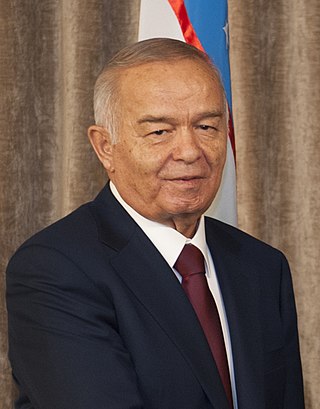
Islam Abduganiyevich Karimov was an Uzbek politician who led Uzbekistan and its predecessor state, the Uzbek Soviet Socialist Republic, from 1989 until his death in 2016. He was the last First Secretary of the Communist Party of Uzbekistan from 1989 to 1991, when the party was reconstituted as the People's Democratic Party of Uzbekistan (O‘zXDP); he led the O‘zXDP until 1996. He was the President of the Uzbek SSR from 24 March 1990 until he declared the independence of Uzbekistan on 1 September 1991.

The Federal Security Service of the Russian Federation is the principal security agency of Russia and the main successor agency to the Soviet Union's KGB; its immediate predecessor was the Federal Counterintelligence Service (FSK) which was reorganized into the FSB in 1995. The three major structural successor components of the former KGB that remain administratively independent of the FSB are the Foreign Intelligence Service (SVR), the Federal Protective Service (FSO), and the Main Directorate of Special Programs of the President of the Russian Federation (GUSP).

Human rights in Uzbekistan have been described as "abysmal" by Human Rights Watch, and the country has received heavy criticism from the UK and the US for alleged arbitrary arrests, religious persecution and torture employed by the government on a regional and national level. Amnesty International stated that freedom of expression, association, and peaceful assembly continue to be restricted, and that relations between gay men are illegal.

George Blake was a spy with Britain's Secret Intelligence Service (MI6) and worked as a double agent for the Soviet Union. He became a communist and decided to work for the MGB while a prisoner during the Korean War. Discovered in 1961 and sentenced to 42 years in prison, he escaped from Wormwood Scrubs prison in west London in 1966 and fled to the Soviet Union. He was not one of the Cambridge Five spies, although he associated with Donald Maclean and Kim Philby after reaching the Soviet Union.

Mustafa Ahmed Adam al-Hawsawi is a Saudi Arabian citizen. He is alleged to have acted as a key financial facilitator for the September 11 attacks in the United States.
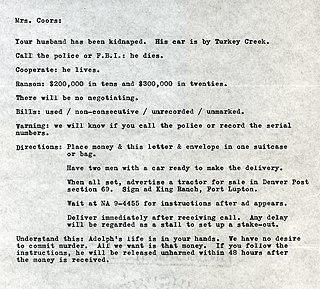
Extraordinary rendition is a euphemism for state-sponsored forcible abduction in another jurisdiction and transfer to a third state. The phrase usually refers to a United States-led program used during the War on Terror, which had the purpose of circumventing the source country's laws on interrogation, detention, extradition and/or torture. Extraordinary rendition is a type of extraterritorial abduction, but not all extraterritorial abductions include transfer to a third country.
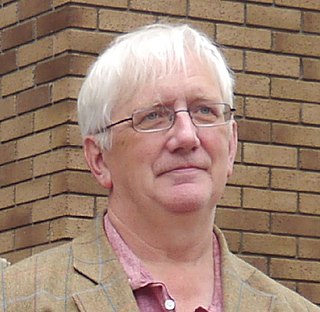
Craig John Murray is a Scottish author, human rights campaigner, journalist, and former diplomat.

The State Security Committee of the Republic of Belarus is the national intelligence agency of Belarus. Along with its counterparts in Transnistria and South Ossetia, it kept the unreformed name after declaring independence.
Timur Ishmuratov is a Russian citizen who was held in extrajudicial detention in the United States Guantanamo Bay detainment camps, in Cuba.
Prior to the 2001 invasion of Afghanistan, the Islamic Movement of Uzbekistan (IMU) posed the greatest threat to the Karimov administration. In 2002 the IMU was reclassified as terrorist by the United States. Since the invasion, the IMU has been greatly weakened due to US military actions which cut off its supply of resources and killed its leader, Juma Namangani.

The National Directorate of Security was the national intelligence and security service of Afghanistan. The headquarters of the NDS was in Kabul, and it had field offices and training facilities in all 34 provinces of Afghanistan. The NDS was part of the Afghan National Security Forces (ANSF).
Billy Fernando Joya Améndola is a former Honduran military officer who worked in the controversial Battalion 3-16, national security adviser at Manuel Zelaya's government, a post in which he has continued.
Surat Khatamovich Ikramov was an Uzbek human rights activist and a critic of Uzbekistan’s authoritarian government. Ikramov was the chair of the Initiative Group of Independent Human Rights Defenders. Since its founding in 2002, the group became one of the most prolific chroniclers of human rights abuses in Uzbekistan, Central Asia's most populous state and an important Western ally in the Afghanistan war.
On 13 May 2005, protests erupted in Andijan, Uzbekistan. At one point, troops from the Uzbek National Security Service (SNB) fired into a crowd of protesters. Estimates of those killed on 13 May range from 187, the official count of the government, to several hundred. A defector from the SNB alleged that 1,500 were killed. The bodies of many of those who died were allegedly hidden in mass graves following the massacre.
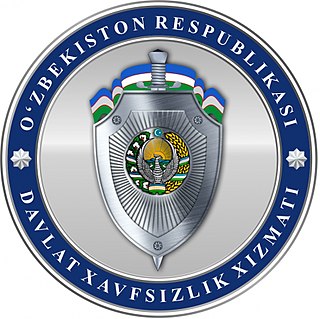
The State Security Service is the national intelligence agency of the government of Uzbekistan. It was created on 26 September 1991 as a successor to the KGB and its republican affiliate in the Uzbek SSR. Since the collapse of the Soviet Union, it has retained the same responsibilities and a similar range of functional units, including paramilitary police and special forces. It was renamed from the National Security Service on 14 March 2018. The SNB was a rival of the Interior Ministry until 2005, when it was brought under its control. In recent years, the SNB has been sidelined in favor of the Uzbekistan National Guard, which was largely seen as being loyal to former president Islam Karimov.

Uzbekistan Airways Flight 1154 (HY1154/UZB1154) was a scheduled domestic passenger flight which was operated by Uzbekistan flag carrier Uzbekistan Airways from Termez Airport in the city of Termez, near the Afghanistan border, to Uzbekistan's capital of Tashkent. On 13 January 2004 the aircraft operating the flight, a Yakovlev Yak-40 registered in Uzbekistan as UK-87985, collided with a radar station while landing at Tashkent, flipped over, caught fire and exploded, killing all 37 people on board. Weather was reportedly in bad condition.
Ali Feruz is an Uzbek Russian journalist and gay rights activist who worked at Novaya Gazeta.
References
- ↑ Peter Marshal (2009-08-11). "Confessions of an Uzbek KGB officer". BBC News. Archived from the original on 2009-08-14. Retrieved 2009-08-16.
- ↑ Confessions of an Uzbek KGB officer (YouTube). BBC News. 2012-07-05. Archived from the original on 2019-07-27. Retrieved 2019-07-26.
- 1 2 "Confessions of a Former KGB was Issued in BBC Newsnight". Turkish Weekly. 2009-08-13. Archived from the original on 2009-08-17. Retrieved 2009-08-16.
- ↑ "Close Read: The Torture Bust". New Yorker magazine. 2009-08-16. Archived from the original on 2009-08-16. Retrieved 2009-08-16.
- ↑ "Former Uzbek Spy Case Sparks Heated Reactions".
- 1 2 "Rights Advocate Contradicts Story of Uzbek 'Spy'". Radio Free Europe . 2011-11-07. Archived from the original on 2019-07-27.
In 2008, Ikramov brought Yakubov as a translator to a human rights conference in London. When they were there, Ikramov says, Yakubov asked for permission to stay in the UK for an extra week 'to study.' Shortly thereafter, Yakubov claimed political asylum. 'These days, he's cut all relations with me,' Ikramov said.
- ↑ Ikrom Yakubov (2017). "The Role of Intelligence in Securitisation Processes: A Tool or An Agent". University of Dundee . Archived from the original on 2019-07-27.